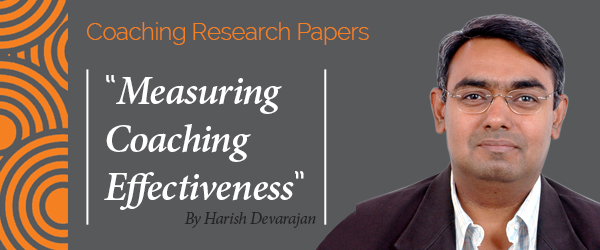Research Paper By Harish Devarajan
(Executive Coach, INDIA)
Introduction
Executive Coaching is the “new kid on the block” as far as development interventions are concerned, at least in the Indian Business Context. It is only in the last 8-10 years that we find Organisations have begun including Coaching as a means of supporting Professional development of their executives.
My view is that Organisations are at the moment “flirting” with Coaching. For most of them this is still an experiment that has not yet been established. The expectations with which these organizations are engaging Coaches are quite varied and diverse. Interestingly not all of their expectations will fall under definition what pristine Coaching can address.
I keep hearing of stories from Coaches as to how some organisations are seeking reports on the Coachee, others who want to know in specific terms what value the Coach has provided. On the other hand I also hear of organizations which have embraced the Culture of Coaching as a key development process and accept the Coach as a process expert whose invisible performance reflects in the executive’s transformation.
Irrespective of where the organization stands on the continuum of Coaching adoption / adaption, they are all interested in ensuring that they are doing something which is effective. They seem to pursue different ways of establishing the effectiveness or absence of it.
Research Methodology and Analysis
As part of my research assignment I decided to seek information from a set of Organisations and Coaches (in India/asia) to get a sense of the current state in terms of Measurement of Coaching Effectiveness in this region. To collect this information I designed a simple and short questionnaire (refer annexure 1).
The response I received from the organizations who have adopted Coaching and the Coaches who provide their services in this region have been consolidated and presented below :
1. Coaching as a support intervention is being offered pre-dominantly to Senior Executives, CXOs and Hi-Potential Managers. There are a few instances of coaching support being offered to first time managers.
2. The main purpose for which Coaching is being offered to Executives in their organization is developing their Leadership capabilities, Preparing them for their next roles and addressing some behavioural aspects. Business Coaching and Functional capability building is less noticed.
3. As regards the need for measurement of Coaching Effectiveness more and more organizations seem to be expressing a need for it. A number of organizations are in fact demanding for very tangible and specific measurement. There are a few organizations (especially those who are focusing on the CXO level) who are leaving it to the Coachees to ensure the benefits.
4. There are a few practices with respect to measurement of effectiveness which have gained popularity and are used by a number of organizations. They are :
Coachee Feedback :
Seeking feedback from the Coachee seems to be the most used method. This varies from a written feedback to a discussion with the Coachee along with the sponsor and Coach. In this manner they get qualitative inputs from the Coachee both about the process and the progress against the set goals.
Stakeholders Feedback :
Seeking qualitative inputs from stakeholders (Boss, few Direct Reports) about the Coachee’s approach and behavior is another method adopted by some organizations. This is an informal method of getting some sense of the change that has taken place in the Coachee’s leadership style and behavior.
360 Degree feedback :
A number of organizations rely on a 360 degree feedback mechanism to gain inputs on the effectiveness of the Coaching support. Usually they administer a 360 degree feedback exercise at the start of the coaching engagement and then repeat this exercise at the end of the engagement to compare the results and decipher the change that has taken place.
Employee / Engagement Surveys :
Where organizations adopt survey techniques on a regular basis they find that to be a good way to measure change in behavior, leadership styles and approaches. The reference to survey scores before coaching support and survey scores after the end of the coaching engagement will indicate the effect of the intervention.
Others :
Infrequently used methods are seeking feedback from Coach, referring to actual performance assessment reports and specific tracking of identified behaviours.
5. The Measurement of Coaching Effectiveness seems to happen both at the end of the process as well as middle of the engagement. The focus of the mid-term review is around the process discipline like whether the sessions are taking place regularly, whether the goals have been identified, the fit between the Coach and the Coachee is fine and if there are any logistical issues which need to be addressed.
